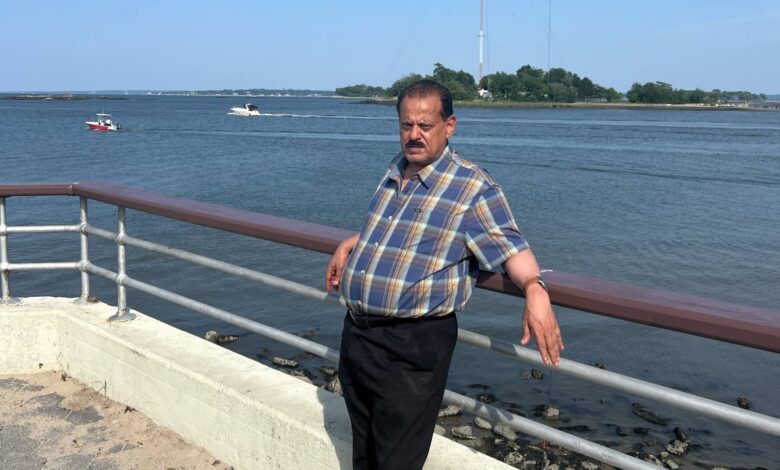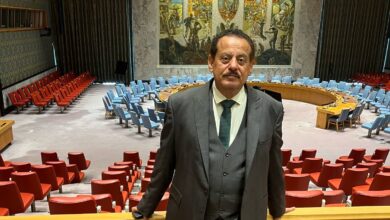Punishments

Yemeni mp
Ahmed Saif Hashed
Any duty officer or even a passing officer in the college grounds could impose any punishment they desired upon you, including those that felt particularly burdensome. Any officer was deemed credible and their word was indisputable. Even a student from the previous batch, not yet graduated, had the authority to enforce punishments, and you had no choice but to comply without objection or hesitation, for they were the ones in authority without a doubt or suspicion.
The prevailing system relied largely on the principle of seniority, and the saying “execute then discuss” held immense significance in the philosophy of military orders and punishments. Should you wish to protest an action or punishment imposed by someone of a higher rank, it was your responsibility to prove the validity of your claims; for, by default, they were considered truthful while you were presumed to be lying, unless you could substantiate your assertions with undeniable evidence.
Moreover, the running system was the only acceptable manner of movement within the college corridors. Walking or moving slowly in the college’s fields and courtyards was strictly prohibited; you were always required to run. If you faltered, relaxed, or slowed down, punishment would be meted out for violating the college’s regulations. There were no standardized penalties to match the severity of offenses; it was left to the discretion of the one who observed the violation, who would then decide on an appropriate punishment.
As for the punishment referred to as “loss,” I found it particularly unjust, especially as it affected the student’s salary; it did not only impact them but also their family’s sustenance! I detest any punishment that affects the innocent, extends beyond the wrongdoer, or takes away from the livelihood of their children and family.
Today, amid this brutal war, salaries have been cut, and the authorities have abandoned their obligations towards the military, employees, and society. There is now unprecedented extortion regarding the payment of salaries and entitlements.
* * *
During my time at the college, I secretly despised the physical punishments imposed on us, particularly what was known as “the crawl,” where a student had to lie flat and then drag themselves on their stomach using their hands and feet. I held these punishments and those who enforced them in contempt; they seemed to me a form of coercion and humiliation. I believe that those who issue such orders are troubled, suffering from deficiencies that blind them to reason and compassion.
I think that dealing with these orders should be framed within the context of training rather than punishment. If the “crawl” were to be part of military training, I could accept and understand its importance. However, to have it practiced as a punishment by superiors on subordinates degrades the student’s dignity, and there is a vast difference between the two, as I perceive and believe.
Military punishments appeared to me as a manifestation of oppression, tyranny, and strict hierarchy. I have always detested certain rules ingrained in military training, especially the one that states: “Execute then discuss.” This principle seems to nullify our intellect, reducing us to mere instruments in the hands of those who lead us to carry out their desires.
With this adage, we were transformed into unthinking, unreasoning tools. I feel that blindly enforcing orders can bring tremendous harm to us and others. Many of the atrocities witnessed during the cycles of violence in the south stemmed from such recklessness, from dangerous orders that were mandated and executed, leading to the destruction of our homeland and countless victims.
Many have executed orders that brought devastation and great suffering to their bearers and the people at large. The implementation of inappropriate commands resulted in painful tragedies that could have been avoided had a modicum of rational thought or questioning been employed beforehand. The destructive consequences of these actions linger with us to this day.
In light of all this, I often questioned myself: it seems my enlistment in the military was a mistake. But how can one foresee the outcomes and intricacies of every path they dream of? Reality often diverges from the envisioned ideal, leading one to realize they have fallen into a significant misjudgment.
* * *
Collective punishments were frequently imposed by certain duty officers, often for trivial reasons against a platoon, section, or even an entire battalion. There was little resistance to these measures, save for the rebellion simmering within some of us, which manifested as restlessness, silent curses, and disdainful glances directed at those who enforced these measures.
I felt that collective punishments crushed my existence, issued by officers who seemed more sadistic than worthy of respect and admiration. The leader deserving of reverence is one who earns respect through good conduct, presenting themselves as a model and an example, garnering the love and respect of their students.
I still remember a collective punishment that forced us to ascend a towering mountain known as (a.r). I nearly fell due to my boots getting caught in a wire stretched across the mountain’s back. Burdened by a heavy backpack, a steel helmet, and field gear, I slipped while descending and nearly plummeted from the mountain’s edge. This experience instilled in me a phobia, exacerbating an old fear from childhood when I had rolled down a hill and nearly met a steep drop that would have torn me apart had I fallen into it.
I developed a recurring phobia of heights, but what weighed more heavily on me was that the recent incident was not a result of military training or a fitness test—justifiable circumstances—but rather a collective punishment imposed on me despite my innocence. I have never accepted collective punishments, viewing them as an outpouring of wrath misplaced and unjust. They affect the innocent, children, and those from whom responsibility has been lifted.
Collective punishments unleash anger inappropriately. I cannot accept such measures; my spirit recoils from them, yet I am forced to comply.
If a mistake occurs or a sound of protest, discontent, or critical restlessness emerges from one of the students in the morning formation—where the duty officer cannot identify the source and the one who made the sound is unwilling to reveal themselves—the officer does not seek to reason or find a way to encourage acknowledgment or testimony. Instead, they hastily resort to collective punishment as a vengeful act. They issue their definitive, often foolish orders to punish the entire platoon, section, or sometimes even the whole batch.
What crime is committed by those who do not even hear the source of the sound, yet suffer the consequences? If the wrongdoing is personal, then what has transpired is lesser than the crime itself; it is an infraction that deserves punishment for the perpetrator, or even for those who collude with them, but it should never extend to the innocent or those unaware of the voice that led to this punishment. I have often pondered this and felt frustrated by the injustice of it all.
I believe that collective punishments are akin to revenge, if not outright revenge themselves, devoid of any rationality. They undermine values, morality, and rights, serving as acts of retribution unrelated to reason. This approach resembles vengeance, replete with foolishness, helplessness, and deep-seated complexes, a heavy inferiority complex that could transform its bearer into a far greater danger in the future, especially if they wield greater and more dangerous power. Collective punishments are among the worst and most disastrous policies, or so I believe.
Today, amid this fierce war, and after seven long years of our people suffering under a suffocating blockade and internal and external aggression, we face collective punishments, oppressive policies, and deliberate cruelty directed at our people more than at the warring factions themselves.
Catastrophic punishments fall heavily upon the ordinary citizen, the simple employee struggling against fate, engaged in a battle for survival. Widespread extortion has turned our people into war casualties, besieged by hunger, famine, corruption, and undeniable injustice.
* * *
I denounce collective punishments and even more so those who impose them. They insult my existence and provoke my feelings intensely. They harden justice and generalize profound injustice, overwhelming me with a torrent of disappointment and despair, making the world seem terrifying and grotesque.
Collective punishments inflicted on the innocent ignite within me feelings of rejection and protest. They compel my acceptance only through profound resentment, perhaps with a sorrow akin to death. I find myself executing these punishments, coerced and forced, and the severity of this coercion is unbearable.
These punishments degrade and cruelly humiliate my humanity. I cannot forget them, no matter how much time passes. They inflict a deep wound on the depths of my soul, making me feel as though they belittle my intellect and demean my dignity, crushing what little respect I have left in this world to the point where I would prefer non-existence over my current state. They squander whatever remains of logic, reason, and possibility, drowning me in the sensation that they violate my existence, possess it, and enslave it.
Whether external or internal, collective punishments reveal the corruption of the conscience of those who impose them and lay bare the barbarity of their authors without a shadow of doubt. They expose arrogance, pride, greed, extremism, and excess. These are punishments that torment us, life, and existence itself, violating what remains of our dignity and honor, belittling our worthiness of this life and our right to humane existence.
These collective punishments, whether internal or external, reveal the savage human jungle we inhabit and the extent of its brutality. They trample upon the justice we have tirelessly sought in distant horizons, suffocating our dreams and the freedoms we longed to embrace, stretching far beyond the horizon.
* * *
The contrast between yesterday and today is beyond description or imagination. Today, amidst this war overflowing with blood, death, and rampant extortion, I endure a pain that splits me in two, cleaving the very ground beneath my feet. It is a profound agony akin to a brutal and sadistic murder.
The suffocating blockade and collective punishments are imposed on the innocent for the sins of those deserving of punishment. The well-known legal principle states, “It is better for justice that a thousand wrongdoers escape than for one innocent person to be condemned.” Yet, international law is tyrannical and unjust, turning this principle upside down, transforming clear rights into mere falsehood and grievous injustice.
Today, war crucifies us with its fateful hand against the wall of poverty, hunger, and the unknown, laughing as it does so. It tears the belly of the sky, aborting our hopes before they are born, reveling in the dance upon our deep wounds. Stakes pierce us from behind, exploding our heads with their sharp edges. It feasts upon what it sees, preferring to replay the scene twice. It subjects us to its hellfire, burning our sails, ships, ports, and shadows, while delivering our dreams into the abyss.
This war does not consume itself; it devours our hearts and everything dear to us. A homeland we have long sought is now tearing apart and burning in a catastrophe that stretches on, a war that refuses to lay down its burdens. Our nation is ravaged by conflict, its regions and sponsors turning it into a terrifying stage where everyone settles their scores. An exhausted and torn body yearns for kindness and gentleness, unable to bear further wounds, bullets, or pain. We search for a just world but find only a haunting absence and colossal loss—an injustice upon injustice, darkness upon darkness.
* * *
What we witness with our own eyes is that thirty million people are besieged, punished, bombed, and starved daily under the pretext of the crimes of a group among them. Thirty million innocent souls are dragged every day into hell without sin or wrongdoing, all for the alleged offenses of perhaps just ten or twenty decision-makers.
What kind of world is this that kills thirty million innocents for the crimes of twenty accused, and yet speaks without shame about law and justice? A world that besieges, starves, tortures, and kills thirty million victims for the sins of twenty suspects. Imagine speaking of restoring rights while, in reality, you kill rights and their bearers every day, multiple times.
This is a barbaric siege and blind, grim collective punishment that makes no distinctions between the guilty and the innocent, between the executioner and the victim. The suffocating blockade weighs heavily on our weary shoulders, as daily bombings target our children and innocent citizens far more than they do our adversaries.
This is a ruthless war in which the victims have no stake. Innocents are completely unrelated to what has happened or is happening, nor do they have any part in the war and conflict. They are the victims of the outcomes and repercussions of this unjust war, laden with catastrophe and fatal regret.
Today, the siege has become both internal and external, violating our rights from A to Z. Most collective punishments do not hold the aggressors accountable; instead, they punish a people who have fallen victim to war, conspiracy, greed, and agendas. Innocent victims bear the brunt of this war, while the criminals who ignited and stoked its flames evade justice, profiting beyond imagination.
* * *
For seven long years, our people have been burdened by this war. Collective punishments and a suffocating blockade have been imposed upon us by foolish, savage, and backward nations, supported by others that wear soft gloves but strike like fire and cut like iron. Behind the masks that claim civilization and sophistication lurks a shocking and terrifying truth—a world of horror, brutality, and shocking savagery.
We are afflicted by shameless authorities and traitors who sell their homeland for a handful of money or personal gain. They gamble with their country out of recklessness, foolishness, or to provoke a rival. Others commit every atrocity imaginable to rule with tyranny and oppression, while some have fallen into servitude so disgraceful that even stones, trees, and swine would be ashamed.
Money can do much in the hands of its slaves and those who seek it at the expense of their homeland and dignity. The world has become a pawn in a chaotic, selfish, and unjust realm. A suffocating blockade and collective punishments gather against us from every side, forces converging upon a homeland torn between fangs and bayonets. Every avenue we once had has been closed off by a thousand barriers, and what little space remains has been confiscated, suffocated, and burdened.
* * *
The blockade imposed upon us in its various forms is supported by an unjust, self-serving international community. This siege and collective punishment lead us to believe that they aim to annihilate life itself, targeting the very essence of our existence rather than individuals or groups.
International law serves the powerful who enslave nations, violate rights, and prioritize interests while indulging in lies. They squander what is moral and humane in favor of the dominance of power, money, and self-interest. This dominance oppresses us from within and without, compounding our suffering and injustice.
There is no justice here. What is happening is a siege supported by the money funneled into the coffers of the states that sustain or collude with this blockade, turning into assets in their banks and resources for other peoples, perhaps unaware that they are feeding off our blood, flesh, and suffering. Meanwhile, these actions are presented as indicators of economic success for their governments.
In wars, the greatest losers and those most harmed are the afflicted peoples, the nations torn apart, the communities shattered, and the laws and systems undermined or dissolved in favor of plunder and corruption. Traders and warlords benefit from the continuation of conflict, seeing in war their great gain, quick profit, and obscene wealth. More than that, no matter how much they enrich themselves, they are never satisfied or fulfilled.
* * *
Those who hold ships carrying oil derivatives hostage at sea are practicing collective punishment against our people. Similarly, those who monopolize the trade of oil derivatives out of greed and profit are also inflicting collective punishment on our population. Thus, our people find themselves living a profound and real tragedy, suffocated by a blockade imposed and managed by the warring factions.
Racism, regionalism, and the resulting exclusion, displacement, and the spread of hatred are war crimes long committed and still being perpetrated against our people and their unity. Even when these practices are cloaked in misleading political titles, they reveal themselves as vile acts of discrimination and group punishment imposed by the warring parties against our citizens.
Excluding our people from public employment or monopolizing it for one side of the conflict, or tying it to tribal, familial, regional, or partisan criteria, is rampant corruption, a despicable act of racism, an affront to citizenship rights, and a blatant violation of equality and justice.
Sana’a Airport has been closed for seven long years, serving as a collective punishment against our people rather than against any specific group claimed to be targeted. In truth, this blockade has only strengthened the group in power, enhancing its popularity and mobilization efforts while attributing its failures to the blockade, profiting immensely in the process.
* * *
We face collective punishment from all sides of the conflict. Every party has engaged in blatant and shameless extortion regarding our salaries and entitlements, leaving us to starve and face uncertainty unless we serve as fodder for their wars and agendas.
Our salaries have been seized through various means. The value of the currency has been squandered to the point where salaries are worth less than charity, and even charitable donations have been withheld. The authorities have abandoned their responsibilities, both legal and moral, despite their obligations as de facto authorities.
The warring factions blame each other for the situation, yet they all benefit from our salaries and entitlements while neglecting their duties toward society, worsening the burdens placed upon us.
All de facto authorities impose hefty and recurring taxes, reaping significant profits while neglecting their obligations to state employees and the community’s needs for essential services like health and education. This collective punishment has been enforced by all parties involved in the conflict in Yemen, with support from those backing them.
* * *
Economic and commercial collective punishments do not only affect the government or state against which they are imposed; they disproportionately impact the victimized population, the innocent civilians.
Today, our people have become victims of international sanctions imposed by foreign nations and the authority that enacted those sanctions. The targeted authority continues to assert its dominance, forcing its will upon the people, while the consequences of these sanctions fall primarily upon our population, far exceeding any effects on the targeted group.
Initially, collective sanctions were the exclusive domain of the Security Council, but now major powers impose them alongside their allies, extending their enforcement to dependent states, as seen with the actions of Britain and the United States through the UAE and Saudi Arabia in what later became known as “the Quartet.”
International law does not reflect the will of the people but rather the desires of states and political regimes, especially the five permanent members of the Security Council. Under the guise of maintaining international peace and security, terrifying sanctions have been imposed on many nations, leading to tragic humanitarian situations, including those faced by Iraq, Yugoslavia, Libya, and Yemen.
The “Quartet” does not target a group that has seized power, but rather aims to dismantle Yemen’s unity, independence, and sovereignty, imposing conflicting identities that oppose the interests of a united Yemen through a relentless war and heavy collective punishments on our people.
Meanwhile, the group publicly targeted by this war inadvertently contributes to the agendas of this dirty conflict, providing justification for the war, dividing Yemen, and occupying its lands while imposing lasting or long-term dominance over them.
This multifaceted blockade and collective punishment has severely harmed our people more than the group against which it is directed. Our population has suffered hunger, famine, and death, some even becoming fodder for a dirty war targeting them directly. It is an unjust blockade that contradicts all that is moral and humane.
We live in a global system that is not only sick and distorted but fundamentally brutal and terrifying. This system is supported by power and driven by money and interests. We have repeatedly confirmed the ugliness of this war we endure, this suffocating blockade tightening around our people, and these collective punishments imposed upon us daily, revealing the nature of this system and the injustices it inflicts on peoples.
Local warring parties and their leaders have exploited this cursed war, the suffocating blockade, and the collective punishments for immense profit, imposing unprecedented taxes and amassing vast financial resources, achieving rapid and obscene wealth at the expense of our people’s suffering and poverty. Our society is collapsing while they thrive and accumulate riches, supported by internal and external forces of war.
The region and its sponsors nurture and protect corruption, and the influence of the corruption lobby has expanded beyond borders and seas, affecting various agencies and organizations, especially the United Nations.
* * *






